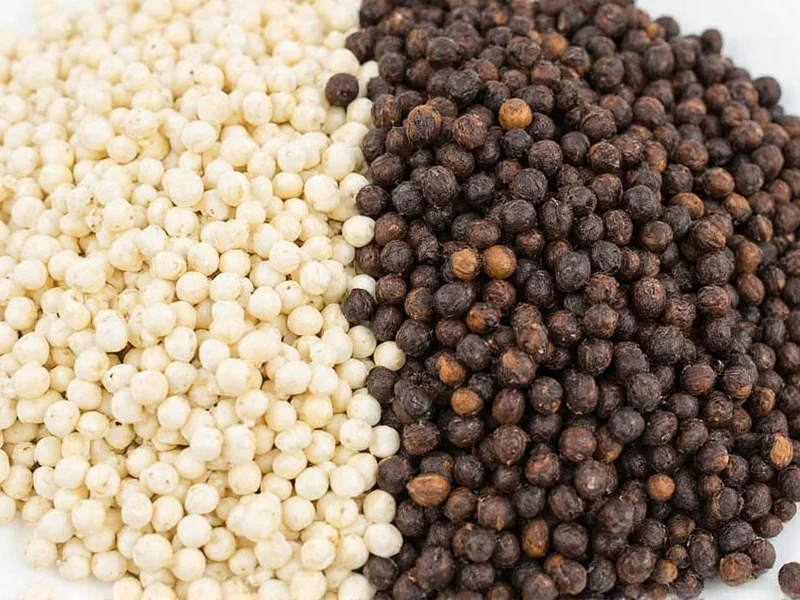Many home cooks wonder about the fundamental distinctions between these two common spices that appear side by side in grocery stores. Despite their visual differences, both originate from the same flowering vine native to South India. Understanding their production processes explains why they taste and behave differently in cooking applications.
Origin and Production: Same Plant, Different Processing
Both black and white pepper derive from Piper nigrum, a tropical vine producing small berries called peppercorns. The critical difference emerges during harvesting and processing:
- Black pepper: Harvested when berries are nearly ripe but still green. They're spread in the sun to dry, during which the outer layer (pericarp) ferments and turns black. This process develops complex flavor compounds.
- White pepper: Allowed to fully ripen on the vine until red. The outer layer is then removed through soaking (retting) or mechanical means before the inner seed is dried. This eliminates many flavor compounds found in the outer layer.
Historically, white pepper became popular in European cuisine partly because its uniform color maintained the visual appeal of light-colored dishes like cream sauces and mashed potatoes. The processing method for white pepper requires additional steps, making it slightly more expensive to produce despite coming from the same source plant.
| Characteristic | Black Pepper | White Pepper |
|---|---|---|
| Harvest Time | Unripe (green) | Fully ripe (red) |
| Processing Method | Dried with outer layer intact | Outer layer removed before drying |
| Flavor Profile | Sharp, complex, floral notes | Earthy, musty, less complex |
| Heat Level | Moderate to high (peaks quickly) | Milder, more gradual heat |
| Visual Impact | Dark specks visible in food | No visible specks |
Flavor Chemistry: Why They Taste Different
The distinctive flavor differences stem from chemical compounds developed during processing. Black pepper contains higher concentrations of piperine (the compound responsible for heat) along with terpenes that create its complex aroma. The fermentation process during black pepper production generates additional flavor compounds.
White pepper lacks many of these outer-layer compounds, resulting in a more one-dimensional flavor profile dominated by piperine with earthy notes from the retting process. Some describe white pepper's flavor as mustier or slightly fermented compared to black pepper's brighter, more complex profile.
When evaluating black pepper versus white pepper heat levels, black pepper typically delivers a sharper, more immediate heat that dissipates faster, while white pepper provides a more gradual, lingering warmth. This difference explains why certain cuisines prefer one over the other for specific dishes.
Culinary Applications: When to Use Each Type
Professional chefs select between black and white pepper based on both flavor and visual considerations:
- Black pepper shines in: Steaks and grilled meats, tomato-based sauces, dark soups and stews, vinaigrettes, and any dish where visible specks enhance appearance
- White pepper works best in: Cream sauces, mashed potatoes, light-colored soups, Chinese stir-fries, fish dishes, and recipes where visual uniformity matters
French cuisine traditionally uses white pepper in many classic preparations to maintain visual elegance, while Southeast Asian cooking often features white pepper for its distinctive flavor profile. In Chinese cuisine, white pepper appears in many traditional remedies and culinary applications where its specific heat profile is preferred.
Understanding when to use white pepper instead of black can significantly impact your cooking results. For instance, adding black pepper to a béchamel sauce creates unattractive specks, while white pepper provides seasoning without visual disruption. Conversely, black pepper's complex flavor enhances simple preparations like scrambled eggs where visual contrast isn't problematic.
Nutritional and Shelf Life Considerations
Both peppers contain similar nutritional profiles since they come from the same plant. The primary difference lies in concentration of certain compounds due to processing. Black pepper contains slightly higher levels of certain antioxidants from the outer layer.
Regarding shelf life, black pepper generally maintains its flavor longer than white pepper. The removal of the protective outer layer in white pepper makes it more susceptible to flavor degradation. For optimal freshness, store both types in airtight containers away from light and heat, and grind them just before use for maximum flavor impact.
Common Misconceptions Clarified
Several myths persist about these spices that deserve clarification:
- Myth: White pepper is milder because it's from a different plant
Fact: Both come from Piper nigrum; white pepper's milder heat comes from processing - Myth: White pepper is always preferable in light-colored dishes
Fact: Flavor considerations should guide your choice; some chefs prefer black pepper's superior flavor even in light dishes - Myth: One is significantly healthier than the other
Fact: Nutritional differences are minimal; both offer similar benefits
Practical Tips for Home Cooks
When working with these essential spices, consider these professional tips:
- Always grind pepper fresh for maximum flavor impact - pre-ground pepper loses potency quickly
- For substitution, use ¾ teaspoon white pepper for every 1 teaspoon black pepper when visual appearance matters
- Store peppercorns in glass containers away from heat sources to preserve volatile oils
- Try different origins (Tellicherry black pepper, Vietnamese white pepper) for nuanced flavor variations
- Toast peppercorns lightly before grinding to enhance flavor complexity
Understanding the difference between black pepper and white pepper helps elevate your cooking from basic seasoning to thoughtful flavor engineering. While they share botanical origins, their distinct processing creates unique culinary tools that serve different purposes in the kitchen. The next time you reach for pepper, consider whether you want the bold complexity of black pepper or the subtle warmth of white pepper for your specific dish.











 浙公网安备
33010002000092号
浙公网安备
33010002000092号 浙B2-20120091-4
浙B2-20120091-4